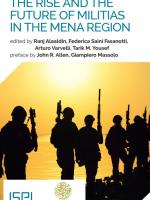Armed non-state actors as local powerholders
Political order in Yemen has always been defined by a weak central state and strong non-state actors. But while Yemen has survived crisis before, years of internal conflict and more than four and half years of military intervention by the Saudi-led coalition have left Yemen more fragmented than at any time in recent history.
The chapter "Fragmentation and Multiple Political Orders in Yemen" by Maria-Louise Clausen outlines how the current political crisis is shaped by Yemen’s recent state-building history where the Yemeni central state could not be understood separate from the long-time president Ali Abdullah Saleh’s patronage network.
The chapter then discusses some of the main current armed non-state actors in Yemen. The Houthis had built their fighting capacity in six rounds of war with President Saleh’s regime. The Houthis home governorate was politically and economically marginalized which meant that the Houthis were able to build some experience in local service provision at a very basic level. The Houthis have now controlled large parts of the north-west Yemen where they are the main governance actor.
In the South, the Southern Transitional Council (STC) has emerged as a key actor, with the support of United Arab Emirates, that challenges the authority of the internationally recognized president Hadi. Although STC does not represent all southerners, it has been able to become formally recognized as a key political actor in the South.
Al-Qaeda has a presence in the south-east of Yemen where it has, periodically, held territory that it ruled with a relatively high degree of pragmatism. Al-Qaeda initially benefitted from the political vacuum created by the transition and subsequent Saudi-led intervention but has been weakened by counter-terrorism policies.
The chapter shows how the political reality in Yemen is fragmented to a degree where any future political order will have to recognize that centralized state authority will be opposed by powerful local actors.
DIIS Experts


